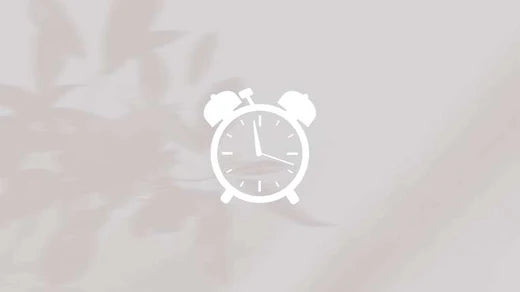Wat is je biologische klok?
Jouw biologische klok regelt een heleboel in je lichaam. Het is als het ware een intern timingmechanisme in jouw lichaam dat biologische processen regelt. Denk daarbij aan het slaap-waakritme, hormoonafgifte en lichaamstemperatuur. De circadiaanse klok - zo wordt het bioritme ook wel genoemd - duurt ongeveer 24 uur en wordt gesynchroniseerd met de dag-nacht cyclus.
Welke invloed heeft je biologische klok op slaap?
Regulering van het slaap-waakritme
Jouw biologische klok speelt een belangrijke rol in het reguleren van het slaap-waakritme. Het zorgt ervoor dat we ons slaperig voelen aan het einde van de dag en juist wakker en alert gedurende de dag. De biologische klok regelt bijvoorbeeld de afgifte van melatonine, het hormoon wat het lichaam helpt om je voor te bereiden op slapen. In de avond neemt je melatonine niveau toe, waardoor je dat slaperige gevoel krijgt.
Kwaliteit van slaap
De biologische klok beïnvloedt ook de kwaliteit van de slaap. Mensen hebben van nature verschillende slaaptijden die worden bepaald door hun interne klok, bekend als chronotype. Mensen met een avondtype (nachtuilen) hebben de neiging om later naar bed te gaan en later wakker te worden, terwijl ochtendtypes (vroege vogels) eerder naar bed gaan en eerder opstaan.
Verstoring
Jouw bioritme kan verstoord raken door bijvoorbeeld nachtdiensten of shifts waarbij je een onregelmatig slaapritme hebt. Hetzelfde geldt voor feestjes tot in de kleine uurtjes. Ook een jetlag kan daar heel veel verstoring veroorzaken, omdat je naar een andere tijdzone gaat kan je merken aan jezelf dat je slaperig bent overdag of moeilijk in slaap komt s’ nachts. Daarnaast heeft kunstlicht ook invloed op jouw biologische klok. Je lichaam stemt af op licht en donker of het tijd is om te gaan slapen, wanneer je lang naar schermen kijkt in de avond kan het zijn dat je moeilijker in slaap komt omdat je melatonine nog niet goed is aangemaakt. Ook cafeïne, stress en andere gezondheidsproblemen kunnen invloed hebben op je bioritme.
Biologische klok ondersteunen
De klok wordt op 31 maart 2024 verzet, ’s nachts om 02:00 gaat de klok een uur vooruit. Ook dit heeft invloed op je biologische klok en je ritme. Je kunt jezelf ondersteunen met de volgende tips niet alleen als de klok wordt verzet, maar vooral het hele jaar door ;)
- Een regelmatig slaapschema, probeer elke dag rond hetzelfde tijdstip te gaan slapen en rond hetzelfde tijdstip op te staan. Yep.. ook in het weekend. Dit helpt je lichaam om een consistente slaap-waakcyclus te ontwikkelen en je eigen biologische klok te stabiliseren.
- Natuurlijk licht. Ga meteen naar buiten zodra je wakker bent en probeer gedurende de dag zoveel mogelijk natuurlijk licht te zien. Dit helpt je om overdag alerter te blijven.
- Kunstlicht: Zet in de avond de lampen zo min mogelijk aan en kijk zo min mogelijk naar schermen van laptops, tv’s, telefoons of tablets. Door dit licht kan je de afgifte van melatonine onderdrukken, wat ervoor zorgt dat je minder goed in slaap valt
- Avond routine: maak voor jezelf een fijne avondroutine waarin je je klaarmaakt voor bed. Je kunt dan denken aan je douchen, kaarsjes aan, een boek lezen en mediteren. Zolang het rustgevend is helpt het je lichaam ontspannen. Daarnaast helpt het ook om een soortgelijke routine aan te houden, zodat je het moment ‘herkent’ dat je je klaarmaakt voor bed en je lichaam zich daarop voorbereid.
- Bewegen: zorg dat je overdag voldoende beweegt en in beweging blijft, het kan je helpen bij een betere nachtrust. Zorg er dan ook voor dat je niet intensief traint vlak voor het slapen gaan, de energie die dan vrij komt zorgt juist voor een wakker gevoel.








